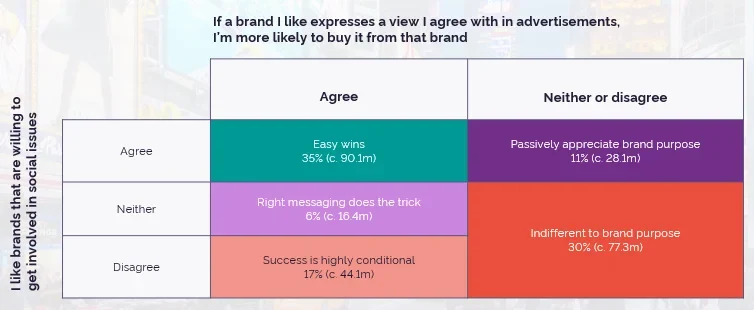
US YouGov Framework: Attitudes to brand purpose
Brands today are increasingly more likely to take positions on key social issues. These positions are often supported by a core brand purpose or a set of brand values.
YouGov Profiles data shows that almost half of all adults in the US (46%) "like brands that are willing to get involved in social issues." But there is a sizeable portion of consumers who are either indifferent to the notion or downright against brands expressing views on social issues.
That means that brand engagement in social issues has the potential to build equity but also comes with the risk of putting some customers off. A new YouGov framework equips marketers and advertisers with data that helps them understand the risks and rewards of getting involved in social issues and where their consumers stand on the topic of brand purpose.
The framework, which draws on data from YouGov Profiles, segments American consumers into different categories based on whether or not they are receptive to the idea of brand purpose generally and whether brand statements on social issues influence their purchase decisions.
Here are the audience categories:
Easy wins: If a brand I like expresses a view I agree with in advertisements, I’m more likely to buy from that brand and I like brands that are willing to get involved in social issues.
Right messaging does the trick: If a brand I like expresses a view I agree with in advertisements, I’m more likely to buy from that brand but I'm on the fence about brands that are willing to get involved in social issues.
Passively appreciate social brand messaging: I’m not more likely to buy because of views in advertisements but I like brands that are willing to get involved in social issues.
Success is highly conditional: If a brand I like expresses a view I agree with in advertisements, I’m more likely to buy from that brand but I dislike brands that are willing to get involved in social issues.
Averse to social brand messaging: Not more likely to buy and doesn't like or is on the fence about brands that are willing to get involved in social issues. This group hasn’t been profiled in this piece.

Easy Wins
This group has a slightly younger skew, with a quarter of the group (26%) aged between 25-34 compared to just 18% of the overall American population.
This group say they are likelier to purchase from brands who express views on social issues that align with their own. But what are the kinds of views that this group is likelier to associate with? Climate change and human rights appear to be two particularly important issues for members of this group, as you can see in the chart.
While these consumers appreciate brand purpose, they expect brands to be authentic about their messaging. Three in five (60%) say it is very important for brands to be authentic compared to a half (52%) of all Americans who feel this way.
Right messaging does the trick
Women have a higher representation in this group compared to the national population (56% vs 51%). Two in five consumers (40%) in this group are aged over 55 (vs 37% nationally).
Consumers in this segment have a slightly higher interest in issues concerning the environment. Over half (54%) of them say that issues related to environmental protection are important (vs 48% nationally). Similarly, 36% of them say it is acceptable for brands to communicate their views on environmental issues compared to a third of all Americans (32%).
Passively appreciate brand purpose
Women make up a larger portion of this group too (57% vs 51% of all Americans). A quarter of all members are aged between 25-34 (24% vs 18%).
While members of this group aren’t likelier to purchase from brands that simply share similar views on social issues, they do appreciate brands that express a purpose. And LGBTQ+ issues are among their priorities. For instance, 36% say it is acceptable for brands to communicate their POV on LGBTQ+ rights (vs 31%).
Success is highly conditional
This group represents a slightly older demographic split with over half of them aged over 55 (vs 37% nationally). Men make up over a half of the numbers in this segment (54% vs 49% nationally).
While this group is generally averse to brands willing to get involved in social issues, they are particularly sensitive about brands expressing political or social issues. Four in five (82%) claim that brands should not express views on political or social issues (vs 55%). Three-quarters of them (76%) feel that brands expressing views on these kinds of issues are trying to exploit them (vs 53%).